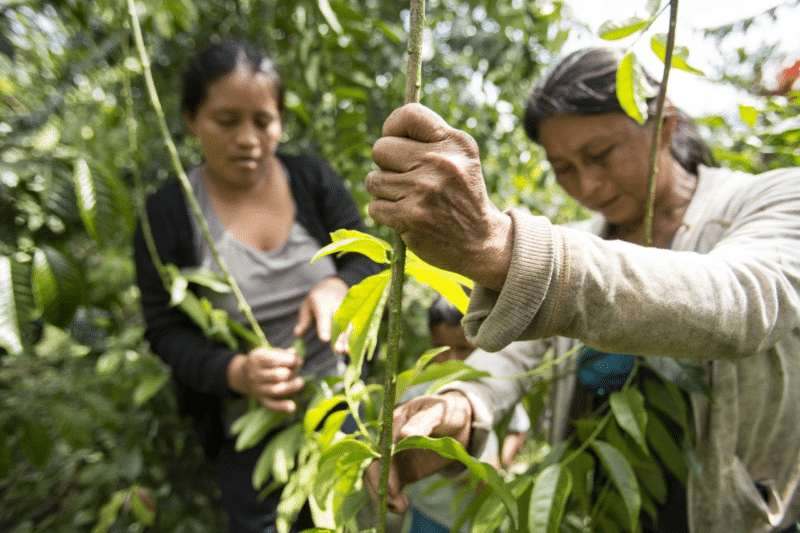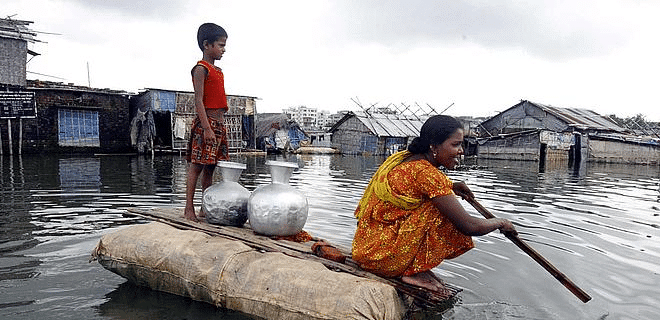
As individuals and communities across the globe suffer the effects of extreme weather, the need for concerted action on climate change has never been more urgent. The 2017 UN climate report found that climate-related events, such as Hurricanes Irma, Harvey and Maria, wildfires in Portugal, unprecedented flooding in Bangladesh, India and Nepal, and coral bleaching in Australia’s Great Barrier Reef, came with a phenomenal financial (estimated at $320 billion) and human cost. Their effects are shifting the environment, altering communities and changing lives; especially, and disproportionately, those of women.
It is an inconvenient truth that women are often hit hardest by environmental issues, particularly those in developing countries. UN figures suggest that around 80 percent of people displaced by climate change are women. Due to the impact of extreme weather on agricultural production, men are often forced to go further afield for work, leaving women to look after the household, provide food and fuel, and take care of the children, leaving them particularly vulnerable when flooding and drought occur. They are first to see the signs of climate change, they bear the brunt of it and have a vested interest in ending it.
The Paris Agreement recognized the disproportionate impact on women and made specific provision for female empowerment, while earlier this year US Congresswoman Barbara Lee introduced the Women and Climate Change Act “to address the disparate impact of climate change on women and support the efforts of women globally to address climate change and for other purposes”. There is an increasing recognition that climate justice and gender justice are fundamentally connected – a fact which is reinforced by the Sustainable Development Goals (SDGs).
It is in this context that green building and the work of the World Green Building Council is increasingly important. The Paris pledge to keep the increase in global average temperatures to well below 2ºC above pre-industrial levels must be followed by real-world action, and the challenges and the solutions are all around us. Globally, building and construction account for more than 30 percent of CO2 emissions. If we continue as we have been, the sector will contribute to 6ºC of global warming. We cannot continue with business as usual.
Green building can also make a significant contribution to meeting the SDGs. It can promote more affordable and clean energy; it can create jobs and boost the economy; and it can spur innovative design and contribute to climate-resilient infrastructure.
That’s why, along with international experts and our partners The Climate Group and C40, the World Green Building Council is calling on governments, businesses and individuals to commit to a future where every single building produces no carbon emissions by 2050 – a future of net zero buildings. Advancing Net Zero is our global project to make that happen. We want all new buildings operating at net zero carbon by 2030 and 100 percent of buildings operating at net zero carbon by 2050. To support this aim, we have just launched the Net Zero Carbon Buildings Commitment. This commitment calls on companies everywhere to take early action and commit to making their buildings net zero by 2030. Of our founding signatories, Majid Al Futtaim – a pioneer in shopping mall, retail and leisure destinations in the Middle East and North Africa – has publicly committed to eliminating operational carbon emissions from all its buildings across 13 countries by 2030. Meanwhile, Integral Group, a global engineering firm specializing in delivery of net zero buildings, has committed to Zero Scope 1 and 2 emissions by 2020 across its 15 global office locations.
Our vision is ambitious, but the property and construction industries have the knowledge and the capability to deliver. It is achievable – technically, financially and politically. There are some tremendous examples of projects that push the boundaries of design and technology. Barangaroo in Sydney, Australia aims to be the first precinct globally to be carbon neutral. The developers have taken a holistic approach to achieving that, looking at waste, energy, water use and wellbeing, and setting challenging targets for agencies, contractors and organizations at Barangaroo, including planting 100 percent native plants in Barangaroo Reserve, using recycled water for flushing toilets and reducing construction waste going into landfill by 97 percent.
The Mineirão Stadium in Belo Horizonte, Brazil is powered by just 10 percent of the solar energy it generates, with the rest supplying more than 1,000 homes in the local community. The solar photovoltaic power plant generated more than 300 MWh in just two months of operation, supplying energy to about 1,200 houses.
These projects show that net zero buildings have the power to transform the places that people live, play, work and learn. They not only have the ability to reduce energy use, but to save money, promote a sense of community and support increased health and wellbeing. They show that a shift in the market can happen. It takes ambition, commitment and vision, but the payback will be huge.
We must move fast if we are to ensure the livability, productivity and long-term sustainability of our cities. The task is urgent. We have to rethink the way we build and the way we live. If our economies are to grow, we need to accelerate the shift to a low-carbon future. We have made a promising start, but there is much still to be done. We are at a turning point. We must walk together towards net zero.
 Terri Wills is CEO of the World Green Building Council, a network of Green Building Councils in over 70 countries. WorldGBC’s mission is to create green buildings for everyone, everywhere, enabling people and planet to thrive today and tomorrow. In March 2017, Terri was named as one of 10 women leading the global push towards climate action, gender equality and social justice for all by Eco-Business. Terri is based in London, UK.
Terri Wills is CEO of the World Green Building Council, a network of Green Building Councils in over 70 countries. WorldGBC’s mission is to create green buildings for everyone, everywhere, enabling people and planet to thrive today and tomorrow. In March 2017, Terri was named as one of 10 women leading the global push towards climate action, gender equality and social justice for all by Eco-Business. Terri is based in London, UK.
 Romilly Madew, CEO of the Green Building Council of Australia, has built a global reputation as a change agent and an influential advocate for sustainable buildings, communities and cities since 2006. She is also a member of the federal government’s Cities Reference Group, Member of the Executive Committee of the Australian Sustainable Built Environment Council, Independent Chair of the Currawong State Park Advisory Board, a member of the Sydney Olympic Park Authority and Chief Executive Women board’s and President of Bilgola Surf Life Saving Club. She has previously been named one of the ‘100 Women of Influence’ by the Australian Financial Review and Westpac, and a National and New South Wales winner of the Telstra Business Women’s Awards. In 2017, she won the WorldGBC Chair’s Award for her outstanding contribution to the global green building movement.
Romilly Madew, CEO of the Green Building Council of Australia, has built a global reputation as a change agent and an influential advocate for sustainable buildings, communities and cities since 2006. She is also a member of the federal government’s Cities Reference Group, Member of the Executive Committee of the Australian Sustainable Built Environment Council, Independent Chair of the Currawong State Park Advisory Board, a member of the Sydney Olympic Park Authority and Chief Executive Women board’s and President of Bilgola Surf Life Saving Club. She has previously been named one of the ‘100 Women of Influence’ by the Australian Financial Review and Westpac, and a National and New South Wales winner of the Telstra Business Women’s Awards. In 2017, she won the WorldGBC Chair’s Award for her outstanding contribution to the global green building movement.


